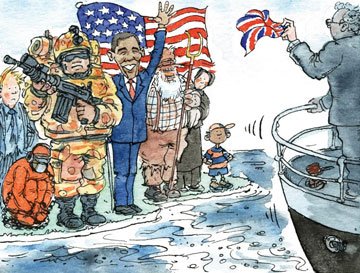
Adrian Wooldridge, The Economist‘s Washington bureau chief and, for the past 13 years, author of the paper’s “Lexington” column, suitably chose July 4th for a farewell column titled “Two Cheers for America.” It’s a great read, one of my first pleasures in having a new subscription to The Economist on my Kindle.
Wooldridge echoes Alex de Tocqueville’s seminal portrait of the United States in 1831, noting that the Frenchman’s initial enthusiasm for the U.S. darkened after 1840, according to a new collection of his writing, Tocqueville on America After 1840: Letters and Other Writings. Wooldridge writes,
It is presumptuous to mention oneself alongside the author of the greatest book written about America. But during the 13 years that the author of this column has spent in the United States, he too has found his initial exuberance clouded by darker thoughts. When he arrived in 1996, America was lord of all it surveyed, the world’s only remaining superpower, convinced of its supreme benevolence, and the engine of a productivity miracle that left Europeans in awe. Social pathologies such as violent crime were being brought under control; almost half of households owned shares. The place had an air of what Mark Twain once called “the serene confidence which a Christian feels in four aces”.
Today, this serene confidence has long gone. Americans are more pessimistic than the Indians or Chinese, worried that their children will not enjoy the opportunities that they have taken for granted. Xenophobia is on the rise, as is nostalgia for a time of stable families and solid values. California, the state that has always reached the future first, is preparing to pay its bills with IOUs.
The departing columnist continues with what I found to be an even-handed account of this nation’s recent troubles, but what I like about The Economist is a certain detachment and distance which makes even its forcefully stated opinions seem like reasonable accounts, not ideological rants. It’s not shy in criticizing Obama. “Whether Mr. Obama can deliver on his promises is open to doubt:” Wooldridge writes, “his inspiring rhetoric is marred by a willingness to compromise with his party’s free-spending establishment in Congress.” As opposed to emotional/ideological attacks on Obama from the right and the left, The Economist‘s brand of analysis fits my stubbornly moderate view of the world.
And by the end of Wooldridge’s farewell, he widens the perspective beyond any one administration, to find the following solid reason for optimism regarding the American experiment:
That is the country’s taste for entrepreneurial capitalism, a taste that arrived with the first settlers and is becoming an ever greater resource, as the global economy is shaken by wave upon wave of disruptive technologies. America still has a genius for incubating entrepreneurs and giving those entrepreneurs the wherewithal to turn bright ideas into global behemoths. America’s biggest company, Wal-Mart, was founded only in 1962; its sexiest, Google, was conceived in a Californian dorm room at about the time that your columnist arrived on these shores. Even as de Tocqueville despaired about the future of his half-adopted country in the 1840s and 1850s, the likes of Carnegie and Rockefeller were about to unleash the greatest productivity miracle the world has seen. That is the America that still promises much.
Well said, old chap! And I for one would not consider it presumptuous if you turned this sane farewell into an introduction for your own contribution to the genre that de Tocqueville initiated nearly 80 years ago.
